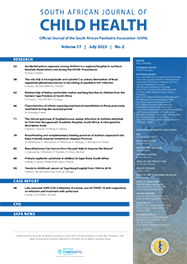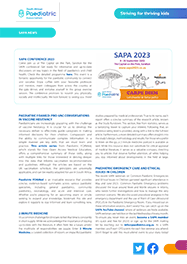Research

Universal newborn hearing screening in public healthcare in South Africa: Challenges to implementation
Abstract
Background. The implementation of early hearing detection and intervention (EHDI) remains a challenge in developing countries, despite the known benefits.
Objectives. To investigate challenges encountered during implementation of universal newborn hearing screening (UNHS) at a secondary-level public hospital in Johannesburg, South Africa.
Methods. A prospective cohort study design that assessed the feasibility of conducting UNHS was adopted. This feasibility assessment was conducted during a 3-month period, and all challenges encountered were identified and documented. Screening time was also recorded for each neonate. Data were entered into Excel, and later analysed using Stata version 11.
Results. Of 2 740 neonates born during the study period, 490 (17.9%) were identified for screening, and distortion product otoacoustic emissions screening was conducted on 121 (4.4%). The majority (74.4%) were screened in the first 24 hours of life. Repeat screening was required in 57 (47.1%) neonates, but only 20 returned for follow-up. The most important challenges to the feasibility of UNHS implementation were the insufficient number of audiologists available to provide screening, the high rate of false positive test results and the unacceptably high rates of loss to follow-up. Two modifiable factors, namely the presence of vernix caseosa in the external ear canal and high ambient noise levels, were found to have significantly influenced the screening process.
Conclusion. The identified challenges are important considerations for any successful implementation of universal screening protocols. Careful planning to mitigate the challenges will have a positive impact on EHDI initiatives in these contexts.
Authors' affiliations
J K Bezuidenhout, Department of Paediatrics and Child Health, School of Clinical Medicine, Faculty of Health Sciences, University of the Witwatersrand, Johannesburg, South Africa
K Khoza-Shangase, Department of Speech Pathology and Audiology, School of Human and Community Development, University of the Witwatersrand, Johannesburg, South Africa
T de Maayer, Department of Paediatrics and Child Health, School of Clinical Medicine, Faculty of Health Sciences, University of the Witwatersrand, Johannesburg, South Africa
R Strehlau, Department of Paediatrics and Child Health, School of Clinical Medicine, Faculty of Health Sciences, University of the Witwatersrand, Johannesburg, South Africa;Empilweni Services and Research Unit, Rahima Moosa Mother and Child Hospital, Johannesburg, South Africa
Full Text
Cite this article
Article History
Date published: 2018-12-14
Article Views
Full text views: 1703

.jpg)



Comments on this article
*Read our policy for posting comments here